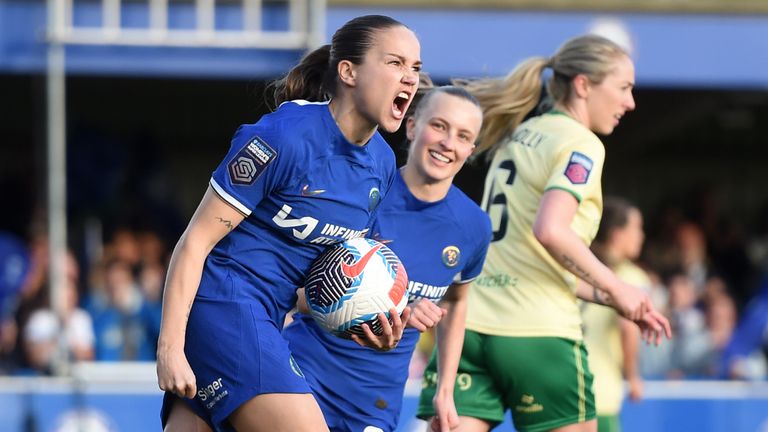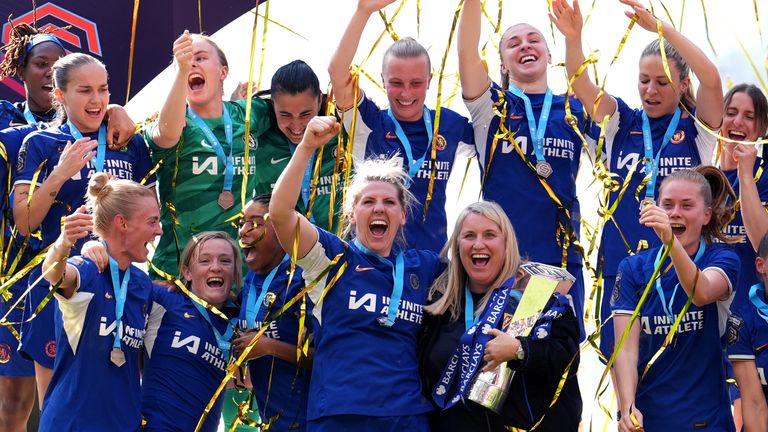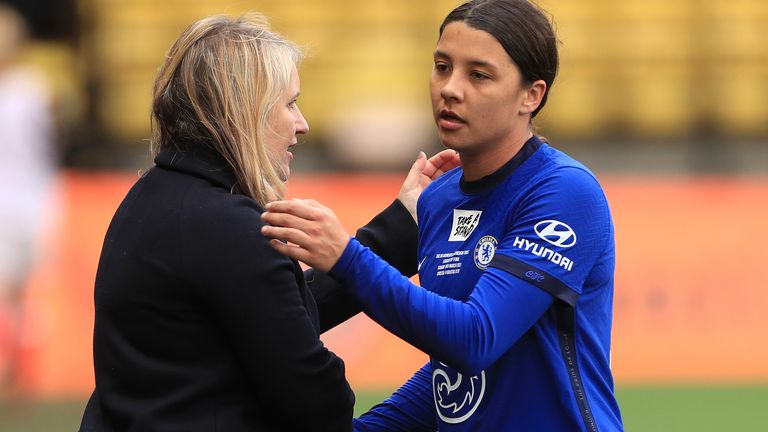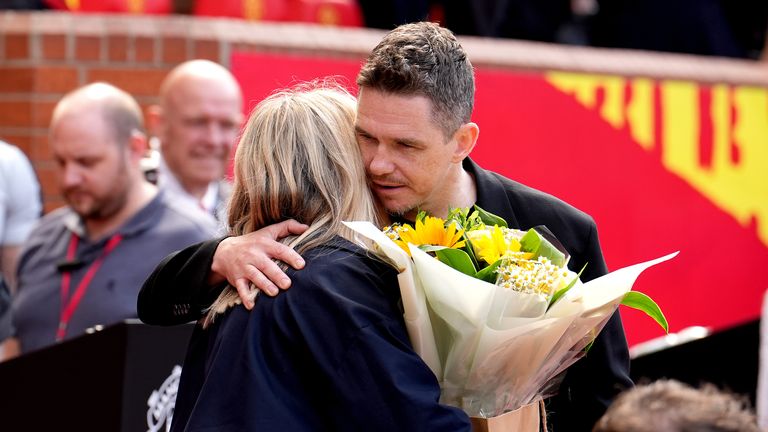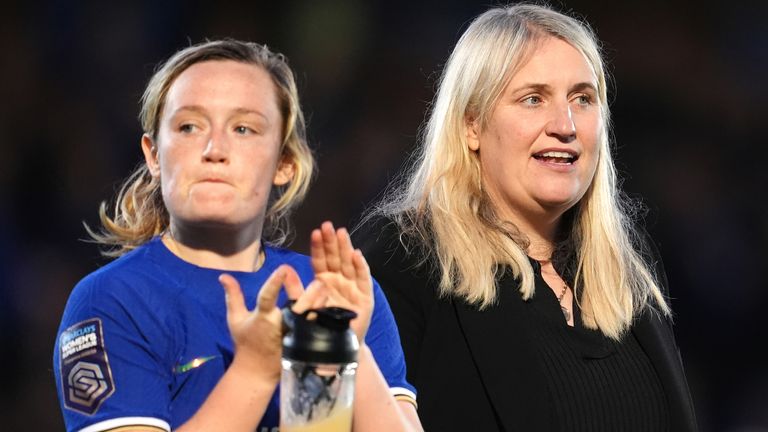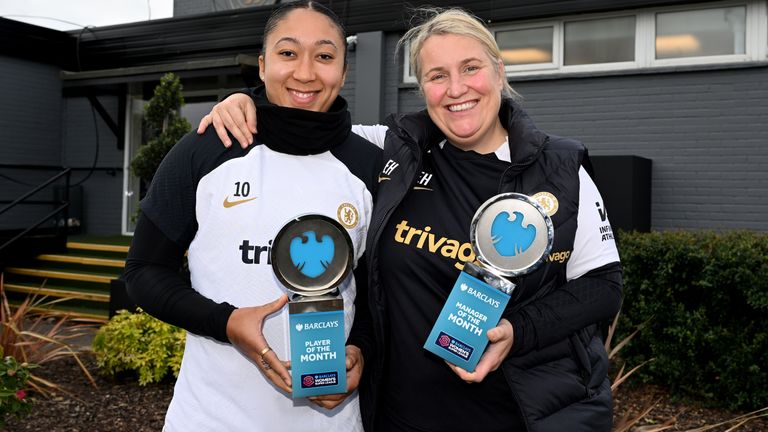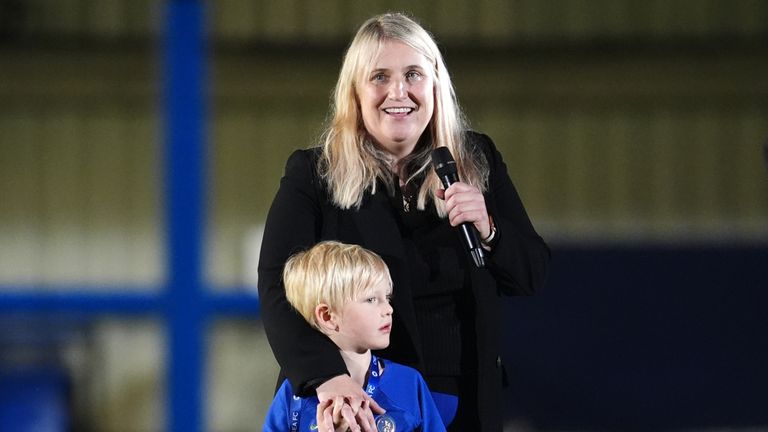A quick Google search of ‘famous leaders’ brings up nine influential men from throughout history. Winston Churchill, Mahatma Gandhi, Abraham Lincoln, among others. Try ‘famous leaders in sport’ and same result – a long list of men.
Scroll down, a fairly substantial way, and female sporting icons begin to appear – tennis stars of their era Billie Jean King and Serena Williams and arguably the first prominent female footballer globally, USWNT striker Mia Hamm.
Pioneering women have a much harder time getting heard, much less seen. And so the work of Emma Hayes, throughout her career, not just at Chelsea, should be celebrated as a landmark triumph for women’s football and women’s sport more broadly.
Perhaps a Google search in some years to come will acknowledge that – particularly after her inimitable style is experienced stateside – but for now, this dedication will have to do.
The Women’s Super League Hayes is leaving, for the top coaching job at USWNT, is unrecognisable from the one she found 12 years ago. This is a rags-to-riches story, with Hayes in the starring role. Allow me to elaborate.
From Camden to Cobham, Hayes arrived at Chelsea without so much as a chair or desk. No dedicated office, no whiteboards, no training pitches. “We probably didn’t even have a bag of balls,” she famously says.
Undeterred, Hayes recognised the game’s vast potential and began building, brick by brick, what is now accepted as one of the best, most competitive, most lucrative leagues worldwide, with Chelsea best in class.
The shake-up has been seismic and only by taking a holistic view can you appreciate the scale.
Amateur status, part-time players (who worked two, sometimes three jobs to make a living), kits designed for men, boots designed for kids, changing rooms designated for Sunday league, and games that were essentially played behind closed doors, such were their obscurity, was the starting point. Women’s football was impoverished.
No TV, no commercial sponsors, minimal funding and functional support, and yet, Hayes saw something very few could at the time. “If I can put it all together, maybe I can create a world-class team,” she remembers thinking.
Twelve years, 14 major trophies and a landmark broadcast deal later, the WSL is on track to become the first billion-pound women’s football league in the world. The game has been standardised and professionalised beyond recognition.
Hayes’ signature is not across the entire process, of course, but her impulse is what instigated the wave of change, one that saw Chelsea overtake Arsenal as the league’s powerhouse.
“The women’s game in England has never been more appealing,” says Alex Culvin, head of women’s football strategy and research at FIFPRO. The numbers back that up. Attendances at WSL matches increased by 200 per cent last season, while 2023-24 saw the competition’s cumulative attendance surpass one million for the first time.
What began, in Hayes’ mind, as a campaign for minimum standards and the right to be viewed as more than “a charity” has snowballed into something exponentially more.
Domestically the game is thriving, and Chelsea have drunk from the cup of success more times than any other, particularly over the second part of Hayes’ resplendent reign.
Knowing success on the pitch would help give her the tools needed to build a brighter future, Hayes focused on the formation of a squad capable of winning silverware. Former Chelsea midfielder and Sky Sports pundit Karen Carney tells the tale through five key signings: Crystal Dunn, Magdalena Eriksson, Millie Bright, Sam Kerr and Ji So-Yun.
Signing and developing some of the best homegrown talent while pulling off transfer coups with impactful foreign imports is part of how Hayes pieced together such a formidable dynasty. Nothing left to chance.
As Hayes and her meticulously-assembled squad delivered on the pitch, she received support and notoriety off it. Chelsea Women became hard to overlook. They became impossible to beat. They morphed into hardened champions, in seasons where titles were expected and in seasons where they were not.
Hayes was enlisted as a TV pundit and panellist, a growing voice in the public consciousness, soon becoming a box-office favourite.
Arsenal, Manchester City and Manchester United all tried to topple her. In the season just gone, Hayes herself conceded defeat to Man City after losing a crucial game to Liverpool – merely smoke and mirrors – before roaring back to steal the WSL title from under City’s feet on goal difference. It was brutal.
“Never write off Chelsea,” she maintains. That is like the eleventh commandment. After ‘thou shall not kill’, comes ‘thou shall not underestimate Hayes’ Chelsea’.
Beyond the trophies and titles is the person. And this part of the narrative is best told through the lens of the players and colleagues who have played for or against the 47-year-old over the past decade.
As part of this piece, various Sky Sports journalists spoke to friends and foes of the Blues boss, and all shared similar conclusions. The words repeated over were legend, winner, pioneer, trailblazer, champion and innovator.
Others included brutal and ruthless. Hayes makes no bones about her dislike for sentimentality. “Our environment has no time for sentiment,” she exclusively told Sky Sports in March. “There’s no emotion with it, it’s very business-like.”
Those that have followed her career closely will recall the clip from DAZN’s 2022 documentary, which shows Hayes savagely vowing to “find better ones” if the current crop of players could not deliver on her exacting plans.
Incidentally, Chelsea went on to win a cup and league double that year.
Kicking down barriers has always been a key message. The phrase coined in the Cobham corridors was: “If it’s not broken, break it”.
At the heart, Hayes is an activist, anchored by her human touch. She has advocated for women’s health, campaigned for more research around menstrual cycle and pelvic floor, is outspoken on issues of fatigue and recovery, body types and nutrition, as well as injuries that plague the game – ACLs for example, as suffered by Chelsea duo Kerr and Mia Fishel this season.
The no-nonsense Londoner bows out having built a winning machine from a team that were second bottom of the WSL at the end of her first full term in charge. Back in 2013, the Blues finished seventh of eight sides, having lost 10 of the final 11 of their 14-fixture season.
With the remarkable transformation that followed, though, Hayes morphed into a managerial great. A leader who has touched nearly every cornerstone of the game.
Fitting, then, that her male equivalent and mentor, Sir Alex Ferguson, was in the crowd for her swansong moment as Chelsea clinched their seventh WSL title with a 6-0 thrashing of Manchester United on her final day in post. When Hayes became the first woman to receive the Football Writers’ Association tribute award earlier this year, the Man Utd legend was the one chosen to offer commendation.
In years to come many parallels will be drawn between the two, for the extraordinary impact they had in their respective fields, as pioneers of the game.
Emotion flooded the lead-up to her final farewell, the guard slipping ever so slightly. “I want the girls to never ever stop asking ‘what can we do better’? I want them to continue to have a voice – and I know they will,” she tearily told Sky Sports.
When all is said and done, that is the part of Hayes’ legacy that deserves greatest praise. Her players were given a platform. They were always treated as co-conspirators, encouraged to speak up and speak out.
Chelsea and Hayes are conspicuous in the very best way.
And yet none of this was accomplished without sacrifice. The responsibility and obligation has taken its toll on Hayes, because football has an ugly side too. The constant flashlight of attention that comes with being the highest achieving team and manager in the land has been challenging.
Headlines have dined on Hayes’ name for years, but the reality is her – sometimes divisive – character has helped the game’s relevancy grow. Her showreel is perfectly punchy.
And so we have come to a point where the monster of the institution she helped build is also the reason she has to step away. It has come full circle. “Sometimes I felt a bit hung out to dry, pushing for higher standards,” she said, in her Chelsea exit interview. “But as my dad always said, someone had to do it. And that was my job.”
That is the bottom line, right? Women’s football wanted its own stage, but it had to convince beyond its own confines. It had to show up, present, pitch, and then go out and prove it. It had to have Hayes. A fearless leader to carry the mantle, who could be unapologetically raw and frank, unconcerned with outside opinion but still able to influence it.
This golden era of progress and change does not happen without its own Fergie figure – someone able to stay one step ahead of the curve while enjoying all-consuming success.
One day sporting literature, and perhaps even Google, will respect that. It is the least Hayes’ legacy deserves.






